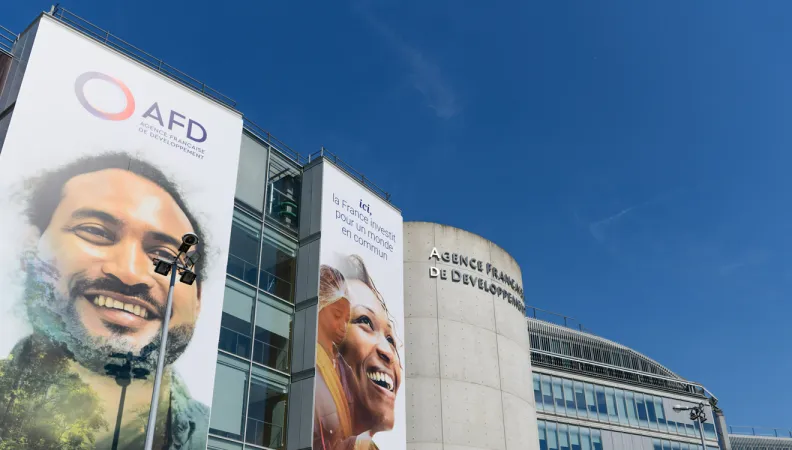Share the page
Live from the Trading Floor: How is AFD Financed?
Published on

As both a development bank and a public institution, AFD allocates grants and loans. The trading floor plays a key and increasingly important role in financing these operations, via international markets.
Here’s a brief description of how it all works.
A Unique Institution
Agence Française de Développement (AFD) is a bank, but one unlike any other: first, because it focuses solely on development financing, and second, because it does not have customers making deposits which could be used to finance the loans it grants. Its status as a finance institution expressly excludes it from receiving funds from the public.
As a result, all loans granted by AFD are refinanced through borrowing, predominantly on a medium- or long-term basis. Hence, the importance of its trading room, from which seven operators manage all of the Group's operations.
The trading room’s role is to manage all financing operations and related risks. These risks can be grouped into three main categories: liquidity risk - in the event that AFD is unable to meet a loan repayment deadline; interest rate risk - if, for example, AFD has granted a loan at a low rate and the rate rises, increasing the cost of its financing; and lastly, foreign exchange risk.
AFD’s policy on these last two risks is simple: the bank conducts hedging operations, also known as swaps, when granting loans at a fixed interest rate or in foreign currencies. For what purpose? In terms of interest rates, all assets and liabilities are economically equivalent to loans or borrowing at variable interest rates. Thus, if market rates were to rise sharply and suddenly, raising the cost of AFD's borrowing - on the liabilities side - the interest accrued on loans granted - on the assets side - would follow the same trajectory.
As for exchange rate risk, with swap operations, it is as if the entire balance sheet was denominated in euros. This risk is therefore eliminated as soon as a loan is granted.
Lending Increasing Rapidly
Liquidity is critical because the bank is lending more and more, in line with the development strategy approved by the executive at the start of François Hollande's five-year term, and confirmed by Emmanuel Macron.
In 2015, loans granted to fund projects in developing and emerging countries generated 3.4 billion euros in disbursements on behalf of AFD. By 2017, this amount had risen to 5.6 billion euros. For 2020, AFD had planned to disburse 7.2 billion; this amount will undoubtedly be exceeded. Moreover, for 2022, the target set (before the crisis) is 9.5 billion.
In order to finance these appropriations, AFD generates recurring revenue from the repayments of previously granted loans. Most of these loans can be amortized year on year. However, this resource is largely inadequate, and all the more so as AFD continues to increase its lending activity each year. Thus, the bank must find additional sources of financing, as its needs could double in just over five years. The bank borrowed 4.8 billion euros in 2014; this amount increased to 6.2 billion in 2017, and will reach 10 billion in 2022. This borrowing is conducted through bond issues.
A Wide Range of Investors
Like any bond issuer, Agence Française de Développement calls on a wide range of investors, with whom its trading room managers meet on a regular basis. In 2019, central banks and other public institutions represented the largest category of investors, buying 41% of the securities issued, followed by asset managers (26%).
AFD issues bonds via major banks, particularly French banks, with maturities ranging from two to 16 years, and even up to 25 years for small amounts.
As a public bank wholly owned by the State, AFD is able to borrow on terms similar to those of the government. Thus, on a 10-year loan, AFD currently has to pay about 0.30% more than the State (an additional 30 basis points). This difference was even lower before the crisis.
The amounts received are used directly to finance loans for development. Furthermore, in preparation for a hypothetical financial crisis, where investors withdraw funds and all new financing is halted, AFD has reserves, a kind of “safety buffer”, equivalent to nine months of lending activity.
Green Bonds, a Policy Choice
AFD has issued a number of green bonds, with the money borrowed being earmarked for loans to fight climate change and preserve the environment. Thus, AFD has proven to be a pioneer in this field. While these “green” securities are increasingly attractive to investors, the payments required are not significantly lower than those on conventional bonds.
Therefore, the issuance of green bonds is essentially a policy choice, in favor of sustainable growth throughout the world.
Some of our Recent Operations:
AFD took advantage of improved conditions on the bond market, following various other actions by market players, to launch two fund-raising operations in euros and dollars in June, equaling a total amount of nearly 1.8 billion euros. The 1 billion-euro transaction had an 18-month maturity while the transaction in US dollars had an 18-month maturity, for an amount equivalent to 896 million euros.
To date, in 2020, AFD has raised almost 7 billion euros on the markets to finance its development loans.
